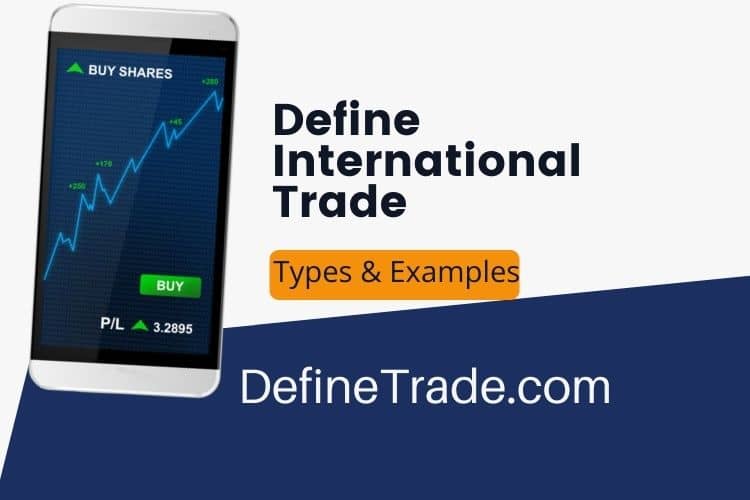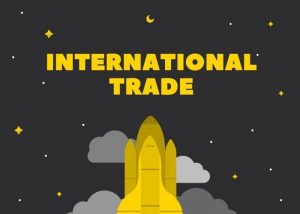Define International Trade and Its Scope in Business

International trade is the exchange of goods and services between countries. It is the process by which countries produce and consume goods and services. International trade occurs when two or more countries trade with each other.
There are a few different types of international trade. The first type is called importation. Importation is when a country buys goods or services from another country. The second type of international trade is called exportation. Exportation is when a country sells goods or services to another country. The third type of international trade is called re-export. Re-export is when a country exports goods to another country, and then the goods are imported back into the first country.

Define International Trade in Bussiness
International trade is important because it allows countries to produce and consume a wider variety of goods and services. International trade also allows countries to specialize in the production of certain goods and services. This specialization can lead to increased efficiency and lower costs. International trade also helps to improve economic conditions in developing countries.
There are a few things that you need to know before you can start trading internationally. The first thing you need to know is the type of trade that you want to do. You also need to know the customs and regulations of the countries involved in the trade. You need to have a good understanding of the currency exchange rates, and you need to be aware of any tariffs or taxes that may apply.
If you are interested in doing international trade, there are a few things that you can do to get started. The first thing you can do is join an online trading community. There are a number of online trading communities that offer information and support for people who want to trade internationally.
You can also sign up for a course or seminar that teaches you about international Business trade. There are a number of schools and universities that offer courses and seminars on international trade. Finally, you can consult with a trade agent or trader to help you get started in international trade.
International trade is a complex process, but it can be very rewarding if you understand the basics. By learning about international trade, you can increase your chances of success in the global marketplace.
Define International Trade Theory
International trade theory also called the Worldwide exchange hypothesis is a sub-field of financial aspects that examines the examples of global exchange, its beginnings, and its government assistance suggestions. Worldwide exchange strategy has been profoundly dubious since the eighteenth century.
Worldwide exchange hypothesis and financial matters themselves have been created as means to assess the impacts of exchange arrangements.
In the proceeding with the advancement of worldwide exchange hypotheses, Michael Porter of Harvard Business School fostered a model to clarify the public upper hand in 1990. Watchman’s hypothesis expressed that a country’s seriousness in an industry relies upon the limit of the business to develop and redesign. His hypothesis zeroed in on clarifying why a few countries are more serious in specific businesses.
To clarify his hypothesis, Porter distinguished four determinants that he connected together. The four determinants are
- Neighbourhood market assets and abilities,
- Nearby market request conditions,
- Neighbourhood providers and reciprocal businesses, and
- Nearby firm attributes.
Nearby market assets and abilities (factor conditions). Doorman perceived the worth of the element extents hypothesis, which thinks about a country’s assets (e.g., normal assets and accessible work) as key factors in figuring out what items a nation will import or product. Watchman added to these fundamental factors another rundown of cutting-edge factors, which he characterized as talented work, interests in instruction, innovation, and foundation. He saw these high-level factors as furnishing a country with a reasonable upper hand.
- Nearby market request conditions. Doorman accepted that a modern home market is basic to guaranteeing progressing advancement, consequently making a supportable upper hand. Organizations whose homegrown business sectors are complex, popular, and requesting powers constant advancement and the improvement of new items and advances. Many sources credit the requesting US buyer with driving US programming organizations to consistently develop, subsequently making a manageable upper hand in programming items and administrations.
- Nearby providers and integral ventures. To stay serious, huge worldwide firms benefit from having solid, productive supporting and related enterprises to give the data sources needed by the business. Certain businesses group topographically, which gives efficiencies and usefulness.
- Nearby firm attributes. Nearby firm attributes incorporate firm procedure, industry construction, and industry contention. Nearby procedure influences a company’s seriousness. A sound degree of contention between nearby firms will prod development and intensity.
In addition to the determinants of the diamond, Porter also noted that government and chance play a part in the national competitiveness of industries. Governments can, by their actions and policies, increase the competitiveness of firms and occasionally entire industries.
Porter’s theory, along with the other modern, firm-based theories, offers an interesting interpretation of international trade trends. Nevertheless, they remain relatively new and minimally tested theories.
Striking Features of International Trade:
Coming up next are the distinctive features of worldwide exchange:
(1) Immobility of Factors:
The level of stability of variables like work and capital is for the most part more prominent between nations than inside a country. Migration laws, citizenship, capabilities, and so forth frequently confine the worldwide portability of labour.
Worldwide capital streams are disallowed or seriously restricted by various state run administrations. Subsequently, the financial meaning of such portability of variables keeps an eye on uniformity inside yet not between nations. For example, wages might be equivalent in Mumbai and Pune yet not in Bombay and London.
As indicated by Harrod, it hence follows that homegrown exchange comprises to a great extent of trade of merchandise between makers who appreciate comparable norms of life, though worldwide exchange comprises of trade of products between makers getting a charge out of generally varying guidelines. Clearly, the standards which decide the course and nature of inside and global exchange will undoubtedly be distinctive in certain regards in any event. In this specific circumstance, it could be brought up that the cost of a ware in the nation where it is created will in general rise to its expense of creation.
The explanation is that if in an industry the cost is higher than its expense, assets will stream into it from different businesses, result will increment and the cost will fall until it is equivalent to the expense of creation. On the other hand, assets will stream out of the business, result will decay, the cost will go up and eventually equivalent the expense of creation. Be that as it may, as among various nations, assets are relatively stable; thus, there is no programmed impact adjusting cost and expenses. Subsequently, there might be extremely durable contrast between the expense of creation of a product.
In one nation and the cost acquired in an alternate country for it. For example, the cost of tea in India must, over the long haul, be equivalent to its expense of creation in India. In any case, in the U.K., the cost of Indian tea might be for all time higher than its expense of creation in India. Along these lines, worldwide exchange varies from home exchange.
(2) Heterogeneous Markets: In the worldwide economy, world business sectors need homogeneity because of contrasts in environment, language, inclinations, propensity, customs, loads and measures, and so on The conduct of worldwide purchasers for each situation would, accordingly, be unique.
(3) Different National Groups: Worldwide exchange happens between contrastingly stuck gatherings. The financial climate varies enormously among various countries.
(4) Different Political Units: Global exchange is a peculiarity that happens among various political units.
(5) Different National Policies and Government Intervention: Monetary and political approaches contrast starting with one country then onto the next. Strategies relating to exchange, trade, commodity and import, tax collection, and so on, additionally vary broadly among nations however they are pretty much uniform inside the country. Levy strategy, import amount framework, appropriations and different controls taken on by state-run administrations meddle with the course of typical exchange between one nation and another.
(6) Different Currencies: One more prominent component of global exchange is that it includes the utilization of various sorts of monetary forms. In this way, every nation has its own approach with respect to trade rates and unfamiliar trade.
What does the Department in International Trade (DIT) do?
The Department for International Trade (DIT) helps organizations send out, drives internal and outward venture, arranges market access and economic agreements, and advocate deregulation. DIT is answerable for advancing British exchange across the world and guaranteeing the UK makes the most of the immense chances open to us. We urge and backing organizations to product and help to distinguish key freedoms for their business. In the Yorkshire and the Humber area we have more than 30 International Trade and internet business counselors who support nearby organizations with coordinated gatherings alongside devoted and fair exhortation. By working with us you will likewise approach financing (for qualified organizations just), live business openings, selective virtual exchange missions and occasions which assist organizations with creating and improve their business.
DIT offers various administrations to assist organizations with making the most of the chance selling abroad can bring. These include:
Administrations are given in north of 100 business sectors all through the world. They are conveyed by:
- Custom fitted and area explicit occasions and virtual exchange missions
- The Export Academy which is means to give little and miniature organizations the skill to offer to clients all over the planet with certainty
- Counsel on selling on the web through e-Marketplaces
- The capacity to look through a large number of current product openings accessible all over the planet
- Subsidizing for qualified organizations as a feature of the DIT Internationalization Fund which can be gotten to through your neighborhood DIT office
There are many advantages of International Trade but few of them are:
1) Disposal of surplus merchandise
One of the upsides of global exchange is that you might have an outlet to discard overflow merchandise that you can’t sell in your home market.
2) Enhanced standing
Carrying on with work in different nations can help your organization’s standing. Accomplishments in a single nation can impact achievement in other nearby nations, which can bring your organization’s profile up in your market specialty. It can likewise assist with expanding your organization’s believability, both abroad and at home. This is one of the upsides of global exchange that might be hard to measure and, accordingly, barely noticeable.
3) Opportunity to practice
Worldwide business sectors can open up roads for another line of administration or items. It can likewise offer you a chance to represent considerable authority in an alternate region to serve that market.
Being presented to the real factors of the world external your headquarters might even start developments, redesigns and efficiencies for your items and administrations. We never realize what happens when we open our brains to thoughts, criticism and encounters that come from beyond our own country.
